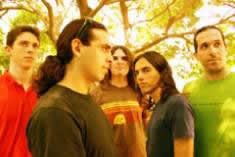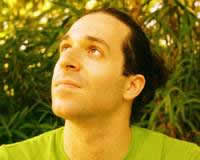 It rarely happens to be impressed in so a positive manner, by a new album, like it happened with "Kundabuffer" by Israelis Sympozion. Their work is reviewed in these pages and for a deeper look I can invite the readers to read it. It rarely happens to be impressed in so a positive manner, by a new album, like it happened with "Kundabuffer" by Israelis Sympozion. Their work is reviewed in these pages and for a deeper look I can invite the readers to read it.
The fact that in final year rankings the band resulted among the top 5 of our readers' preferences, and the only non-Italian one, seems to me a really big success, for a young band at its very first recording experience.
Some weeks ago, afterwards a very welcome idea of the editing staff of Arlequins, I prepared a batch of questions to which band's keyboard player, Arik Hayat, kindly answered in detailed and satisfactory manner.
To the band I send my particular thanks and my wish for a splendid and profitable continuation. This is the result:
It’s really difficult for a group to explain what their music is like. For us, Sympozion are definitely a prog group but, beyond your influence and your present listens, how do you find your place in the nowadays musical world?
Me and Elad founded this group as enthusiastic prog lovers, but at the beginning we were not writing prog at all. Our material was eclectic experimentation which is closer to some early 20th century classical composers than to prog, and our group was a chamber quartet (piano, guitar, flute and cello) which gradually grew to become a small big-band (keys, bass, guitar, drums, three saxes and flute) and then reduced to the present form.
From our play in composition came a style which is very prog-oriented. I believe it is still an interesting ground for composing, but we are having lots of fun experiencing many other styles of music. I don’t have a reason to label or limit our musical experience, other than catalogue issues, which is not our problem. For most listeners today it really doesn’t matter whether it’s prog or jazz or whatever – Sympozion is what it is, and that’s the only label we need.
The world is concerned about the political and social situation that is taking place in Israel; even this is not the right seat to discuss about it, yet I’d like to ask you if the ones who make art are anyhow involved in it and if your song “Happy War Holiday” in particular, contains a message of that kind?
"Happy War Holiday" was composed when USA invaded Iraq. Basically it’s a purely musical expression, but at the time I was hearing people say “finally, some action”, when referring to the war. It obviously came from people that never experienced a real war and all they know about wars comes from movies, where the good guys always survive. It was just a little weird for me and this feeling found its way to the title of the piece, and maybe to some of its musical moments.
The situation in Israel is usually chaotic to some degree and somehow people can choose whether to be effected by it or not. Many artists here make this their main issue. We come with a notion that making just music without any political reference is very legitimate – it’s a universe upon itself and it can also interact with everyday lives on an abstract dimension and maybe have a more positive and constructive effect when compared to songs that take a stand on politics.
 I Think I’ve been among the first ones in Italy to get a copy of "Kundabuffer" and write a review for Arlequins. I Must thank a friend of mine, an Israeli doctor, who on the way back home from a visit to his relatives, brought it to me. I fell in love with your music instantly! I think it is well played and intriguing. Could you explain how you started your music and the reason why you chose a less popular genre and consequently less commercial? I Think I’ve been among the first ones in Italy to get a copy of "Kundabuffer" and write a review for Arlequins. I Must thank a friend of mine, an Israeli doctor, who on the way back home from a visit to his relatives, brought it to me. I fell in love with your music instantly! I think it is well played and intriguing. Could you explain how you started your music and the reason why you chose a less popular genre and consequently less commercial?
We found ourselves playing with less commercial forms of music for many reasons, but at the time it was obvious that we just really didn’t like what we heard on the radio and sometimes it was just a reaction to that. Prog is a very colourful and flexible musical language and you can express a very wide range of emotions and ideas with it. Sometimes we write a piece which has a purely aesthetic focus and at other times the music can reflect emotional events and states that we go through. In all cases it is a reflection of who we are and of our inner worlds. Maybe what is common to all these influences is the search for something new, mysterious and surprising. I can also add that there is a constant search for more precise and pure ways to express our ideas and emotions; an attempt to find the simplest way to introduce any idea, whether it’s simple or complex.
In the world of Israeli music, prog music plays an important role, even if it is not very well spread. What do 70s groups like Sheshet, Fourteen Octaves, Zingale or more latest ones, Ahvak represent for your way of playing and writing music?
I think all the artists that you mentioned are considered to portray the essence of the local culture and the experience of everyday life in Israel. We obviously know and like most of this music, but generally that’s not what we do, or at least not directly. Often we see our music as something fun to play and write, and it is a path that will surprise us as much as we will allow it, but I know that at least at this point in time our experience is quite escapist in relation to current events. Personally, the Israeli artists that had the greatest affect on my writings are Matti Caspi and Shlomo Ydov.
In the review I wrote about "Kundabuffer", I spoke about Frank Zappa and Gentle Giant influence, European minimalism as well, and yet I detected a resonance which can be compared to Canterbury sound, National Health, in particular, but you never mentioned them as reference of yours. What do you think?
I guess we just didn’t think about them when we went over the list of influences, but we respect that stream very much. It seems that the positive vibe in Canterbury music permeated strongly into our music.
"Kundabuffer" contains two songs in your mother tongue. I think your language is very interesting and suitable to particular and odd rhythms. What is the main topic in these songs? Will it be possible to listen to other melodies of the same charm in your next work?
"Bird" is basically a song about flying high, and can be interpreted in many ways; "Zona" talks about experiences of going to a prostitute. I believe there will be more songs in our future – Hebrew is indeed a very potent language in terms of song writing and I know that in some cases the sung word is more powerful than a thousand instrumental notes.
Listening to your songs one gets the sensation that the performer has much room for improvisation. Do you agree or do you have very defined tablatures?
In most cases the pieces are scored in high definition. Once we start playing the piece we come across possibilities that are hidden during composition, and many parts change and get better. I consider it to be a part of the whole composition process. Real “live” improvisations in the form of solos happen in defined parts of the pieces. This was the case in Kundabuffer – it can change in the future.
Almost all the reviews for your first album highlight the quite modern resonance, lacking in vintage sounds, especially for drums. What kind of choice do you make for the recording of the sounds and how do they take place?
In the making of "Kundabuffer" we didn't have a solid concept for choosing the sounds, but we did know that we are not looking for a recreation of the 1970’s vintage sound. Working with Udi Koomran was a fresh experience for us. In Udi’s previous work we heard a very precise, detailed and mature approach which was right up our alley.
The drums sound are a matter of taste and most of us love how they sound in the album. The guitars are very clean most of the time – I think it fits the music and our general aesthetic approach in this album. As for the keyboards – I was never a sound freak and I didn’t come with prepared sounds to the studio. Most of the keyboard sounds on the album appear as a result of hours of searching by Udi and me.
Could you explain how you passed from the Thousand Records to the Unicorn Records, one of the “Majors” talking about rock progressive? Will this change affect anyhow your way of performing?
When we finished making the album we sent copies to all the major prog labels and many more. All the offers we received were between unsatisfactory and insulting, making us feel that the labels are doing us a favour in publishing our music. We were lucky then to have a manager, Raya Kosovsky, and together we decided to do it ourselves. The artwork was made by my sister, Sarit Hayat, and the rest of the work (printing, registering, advertising etc.) was done by Raya, with some help from Udi. Eventually the album got through to people and we are still receiving lots of great feedback from listeners all around the world.
In the summer of 2006 Unicorn Records approached us with an offer for a re-printing and distribution of the album. This time it was a decent offer which wasn’t disrespectful and after some negotiation we signed the contract. So far we are very pleased with our collaboration with Unicorn.
I can’t see how this may change our way of performing, since this is a non-musical issue. And yet, working with Unicorn is both flattering and important in many other aspects.
I’d be very interested to see you performing alive. Have you planned any tour?
We made some efforts towards playing abroad but it’s not as simple as it may appear to be. Generally we play live in clubs in Israel from time to time, and playing abroad is definitely something we want to do in the future.
|